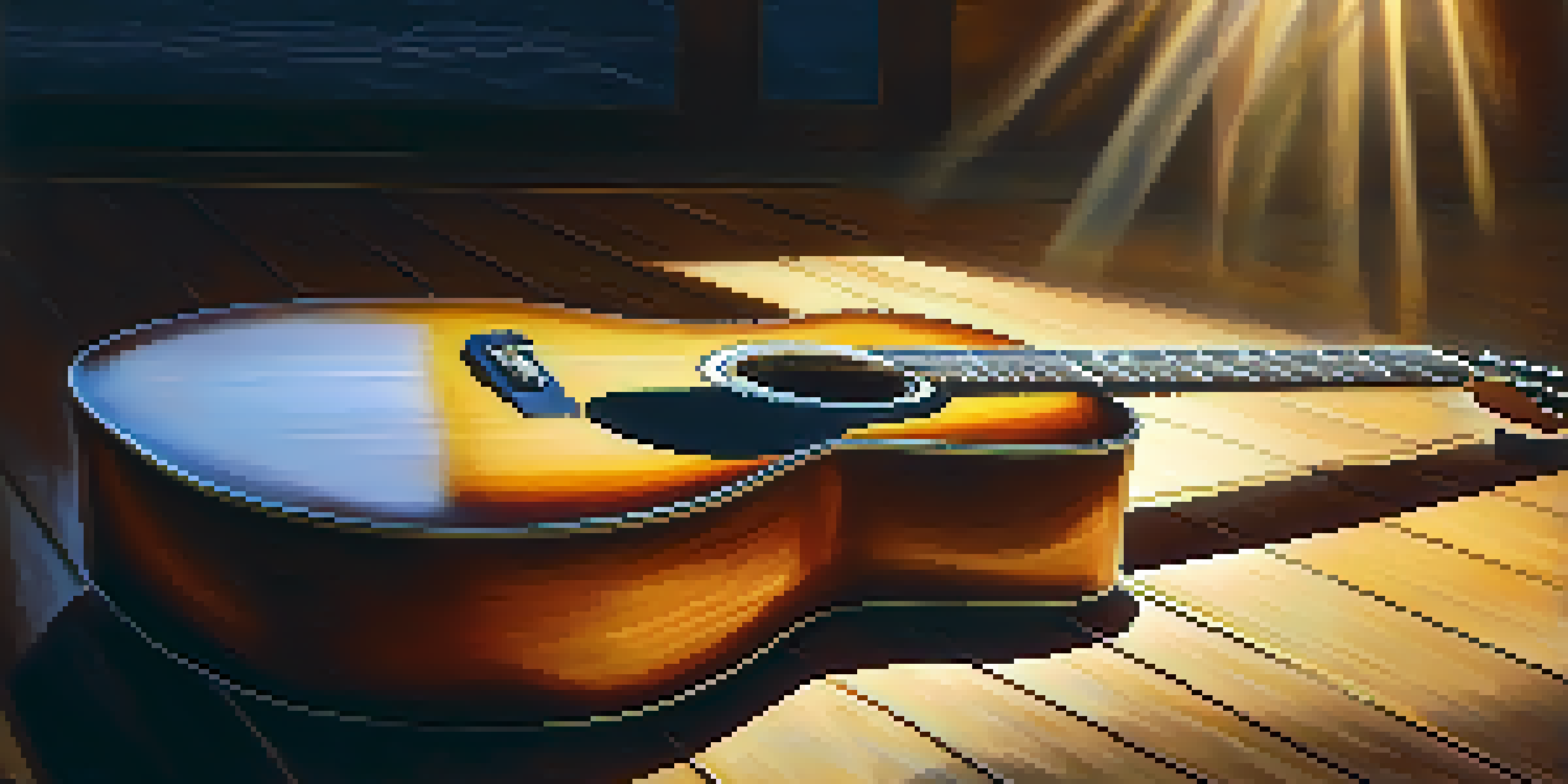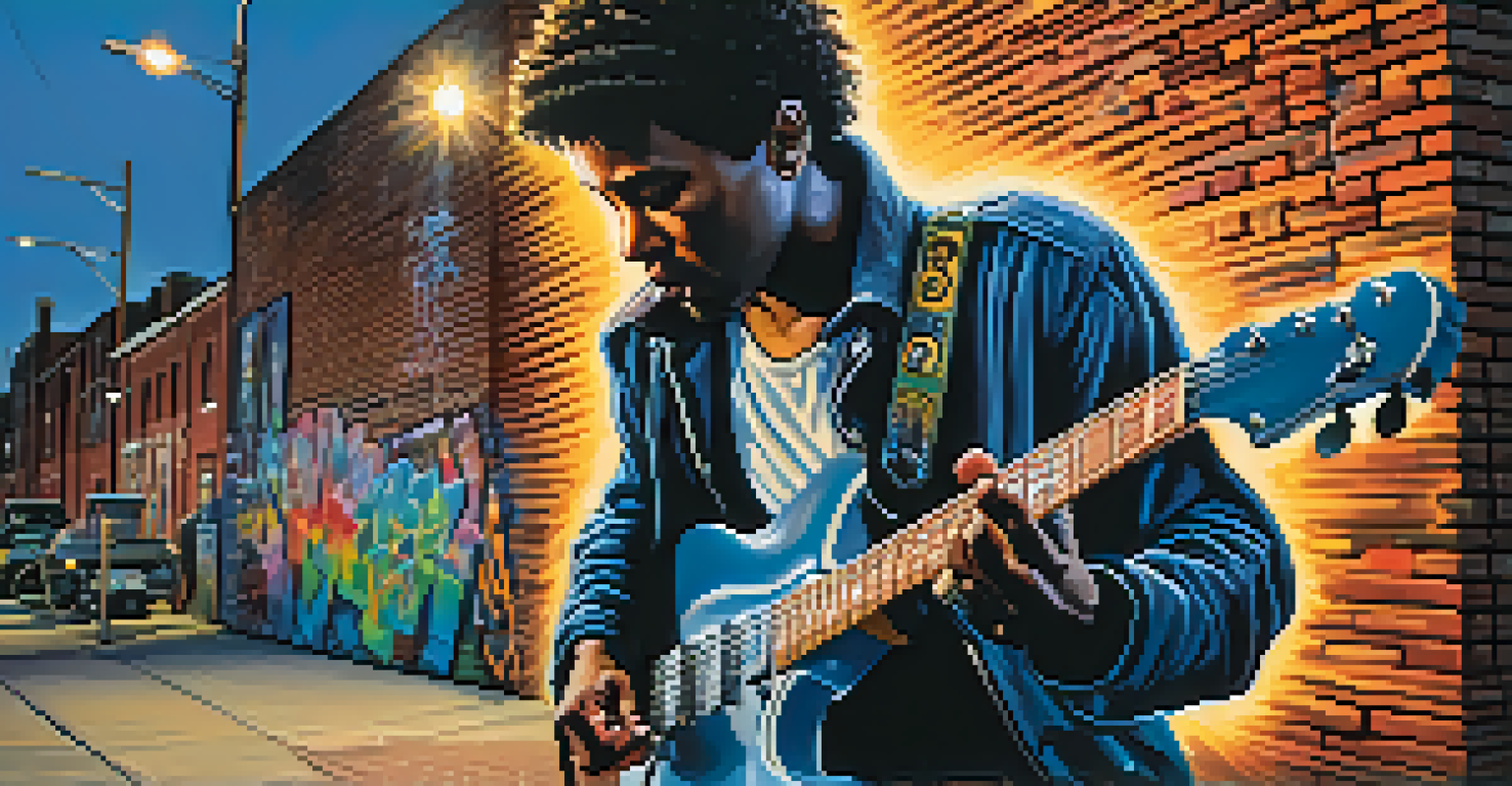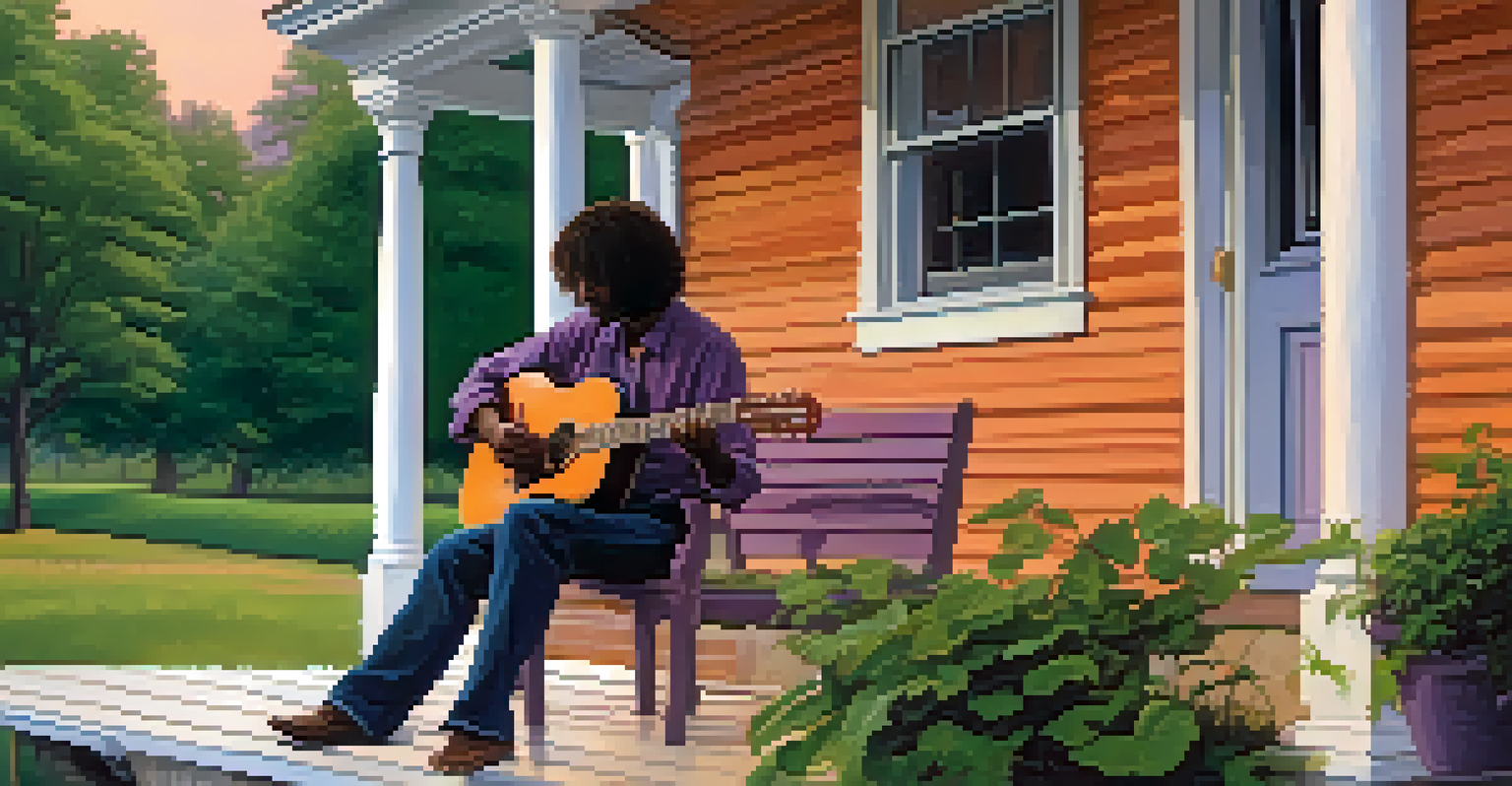The Influence of Blues Guitar on Cultural Expression

Understanding the Roots of Blues Guitar in American Culture
Blues guitar has deep roots in American history, emerging from the African American experience in the South. It reflects the struggles, hopes, and dreams of individuals facing adversity, making it a powerful form of cultural expression. The genre originated in the late 19th century, blending African musical traditions with folk elements, creating a sound that resonates with many.
The blues is a form of music that has the ability to tell stories about suffering and hope, capturing the essence of the human experience.
As musicians began to incorporate storytelling into their music, the blues became a vehicle for conveying personal and collective experiences. This storytelling aspect is crucial, as it allows listeners to connect emotionally with the artist's journey. The themes often revolve around love, loss, and resilience, making the blues a relatable and enduring genre.
Moreover, the improvisational nature of blues guitar allows musicians to express themselves uniquely, showcasing individual creativity. This freedom of expression not only enriches the genre but also contributes to the cultural tapestry of America, influencing various musical styles that followed.
The Evolution of Blues Guitar Through the Decades
Blues guitar has undergone significant transformation since its inception, reflecting the changing social landscape. In the 1920s, the Delta blues emerged, characterized by its raw sound and emotional intensity, often performed solo with a slide guitar. This style laid the groundwork for future developments, inspiring countless musicians across genres.

As the blues migrated north during the Great Migration, it began to evolve into urban styles like Chicago blues. Electric guitars and amplifiers became prominent, bringing a new energy to the genre. Artists like Muddy Waters and Howlin' Wolf adapted the sound to urban audiences, further solidifying the blues' place in American music history.
Blues Guitar's Cultural Significance
Blues guitar serves as a profound form of cultural expression, reflecting the struggles and hopes of the African American experience in America.
The fusion of blues with rock 'n' roll in the 1950s marked another pivotal moment, as artists like B.B. King and Chuck Berry brought the genre to mainstream attention. This cross-pollination not only enhanced the blues' popularity but also opened doors for future genres like jazz and hip-hop, showcasing its lasting impact on cultural expression.
Iconic Blues Guitarists and Their Cultural Impact
Throughout history, several iconic blues guitarists have emerged, each leaving an indelible mark on the culture. Artists like Robert Johnson, often referred to as the 'King of the Delta Blues,' influenced many musicians with his unique guitar techniques and haunting vocals. His work has inspired generations, showing how one artist's voice can shape an entire genre.
Blues is the foundation of all modern music, a genre that transcends boundaries and connects people through shared emotions.
B.B. King, known for his expressive bending of notes, brought the blues into the mainstream and became a cultural ambassador for the genre. His ability to convey deep emotion through his playing made him a beloved figure worldwide. King's legacy is not just in his music but also in his role in promoting blues culture globally.
Additionally, guitarists like Stevie Ray Vaughan revitalized the blues in the 1980s, blending it with rock elements and introducing it to a new audience. Vaughan’s technical prowess and passionate performances exemplified how blues guitar can evolve while still honoring its roots, reinforcing the genre's relevance in contemporary culture.
Blues Guitar as a Tool for Social Change
Blues guitar has often served as a powerful tool for social change, reflecting social injustices and promoting awareness. Many songs address themes of racial inequality and personal struggles, allowing artists to voice their frustrations and inspire change. This aspect of the blues remains vital in today's conversations around social justice.
For instance, songs like 'Strange Fruit' by Billie Holiday, though not a traditional blues piece, embody the genre's spirit of addressing deep societal issues. The haunting lyrics and emotional delivery resonate with listeners, highlighting the blues' role in confronting uncomfortable truths. Musicians use their platforms to raise awareness and advocate for change, showcasing the genre's powerful cultural influence.
Evolution and Influence of Blues
The genre has transformed over the decades, influencing rock, jazz, and hip-hop while maintaining its core elements.
Furthermore, contemporary blues artists continue to weave social commentary into their music. By addressing current issues through their lyrics, they keep the conversation alive, encouraging listeners to reflect and act. This ongoing dialogue demonstrates how blues guitar remains relevant, acting as a mirror to society while inspiring hope and resilience.
The Blues Guitar's Influence on Other Music Genres
The influence of blues guitar extends far beyond its own genre, impacting a wide range of musical styles. Rock, jazz, country, and even hip-hop have drawn inspiration from blues elements, showcasing its versatility and enduring appeal. The incorporation of blues guitar riffs and chord progressions can be found in the works of countless artists across genres.
For example, rock legends like Eric Clapton and Led Zeppelin infused blues guitar techniques into their music, creating a sound that captivated audiences worldwide. These artists not only paid homage to the blues but also helped introduce its rich heritage to a new generation of listeners. This cross-genre inspiration highlights how blues continues to shape the musical landscape.
Additionally, contemporary artists like Gary Clark Jr. and John Mayer blend blues with pop and rock, ensuring that the genre remains relevant and accessible. Their ability to merge different styles while honoring blues traditions reflects the genre's adaptability and ongoing influence on cultural expression.
The Global Reach of Blues Guitar
While blues guitar has its roots in American culture, its influence has spread globally, resonating with musicians and audiences worldwide. Countries like the UK, France, and even Japan have embraced the genre, creating unique interpretations that reflect their own cultural contexts. This global reach speaks to the universal themes found within blues music.
For instance, British blues artists like The Rolling Stones and Eric Clapton gained inspiration from American blues legends, helping to popularize the genre in the UK during the 1960s. Their interpretations introduced blues to a broader audience, showcasing its relevance across cultures and time periods. The global exchange of musical ideas enriches the genre and highlights its cultural significance.
Blues as a Voice for Change
Blues guitar has historically addressed social injustices, allowing artists to inspire awareness and promote social change through their music.
In Japan, musicians have incorporated blues elements into their music, creating a unique fusion that celebrates both traditional and modern influences. This blending of cultures not only preserves the essence of the blues but also showcases its adaptability, proving that music can transcend borders and connect people through shared experiences.
The Future of Blues Guitar in Cultural Expression
As we look to the future, the blues guitar continues to evolve, blending with contemporary sounds while maintaining its core essence. New generations of musicians are experimenting with the genre, infusing it with elements of hip-hop, electronic music, and even world music. This innovation ensures that the blues remains a living, breathing form of cultural expression.
Moreover, the rise of social media and streaming platforms has given artists a global stage to share their music, reaching audiences that were previously inaccessible. This democratization of music allows diverse voices within the blues community to emerge, enriching the genre with fresh perspectives. The accessibility of these platforms fosters a vibrant blues culture that embraces change while honoring tradition.

Ultimately, the future of blues guitar lies in its ability to adapt and resonate with new audiences. By continuing to address relevant themes and incorporating innovative sounds, the blues will remain a powerful tool for cultural expression, ensuring that its rich legacy endures for generations to come.